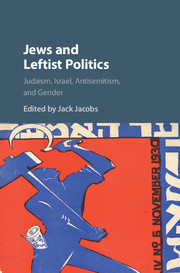Book contents
- Frontmatter
- Contents
- List of Contributors
- Acknowledgments
- Introduction
- PART ONE POLITICAL IMPLICATIONS OF JUDAISM
- PART TWO ANTISEMITISM AND THE LEFT
- PART THREE ISRAEL, ZIONISM, AND THE LEFT
- PART FOUR JEWS AND COMMUNISM
- PART FIVE GENDERED PERSPECTIVES
- PART SIX CANONICAL FIGURES
- PART SEVEN CASE STUDIES
- 15 The Soviet Union, Jewish Concerns, and the New York Electoral Left, 1939-1944
- 16 Jews and the Left at the New School
- 17 Deutscher and the Jews: On the Non-Jewish Jew - An Analysis and Personal Reflection
- Glossary
- Index
15 - The Soviet Union, Jewish Concerns, and the New York Electoral Left, 1939-1944
from PART SEVEN - CASE STUDIES
Published online by Cambridge University Press: 13 April 2017
- Frontmatter
- Contents
- List of Contributors
- Acknowledgments
- Introduction
- PART ONE POLITICAL IMPLICATIONS OF JUDAISM
- PART TWO ANTISEMITISM AND THE LEFT
- PART THREE ISRAEL, ZIONISM, AND THE LEFT
- PART FOUR JEWS AND COMMUNISM
- PART FIVE GENDERED PERSPECTIVES
- PART SIX CANONICAL FIGURES
- PART SEVEN CASE STUDIES
- 15 The Soviet Union, Jewish Concerns, and the New York Electoral Left, 1939-1944
- 16 Jews and the Left at the New School
- 17 Deutscher and the Jews: On the Non-Jewish Jew - An Analysis and Personal Reflection
- Glossary
- Index
Summary
From its founding in 1936 to the middle of the 1940s, the American Labor Party (ALP) was the main electoral vehicle of the New York left. It provided significant support for New Deal candidates from Franklin Roosevelt himself to Mayor Fiorello La Guardia, and occasionally elected its own members to office. The ALP pushed for the extension of the New Deal welfare state and for prolabor and pro–civil rights legislation. Rooted especially in the garment unions, it had a sizable presence in the city's working-class and lower-middle-class Jewish neighborhoods, where it was often the second party behind the Democrats. Its leadership was also largely, though not exclusively, Jewish. The party included both Communist/Popular Frontist elements and anti-Communist social democrats, and for several years the two factions engaged in bitter battles for control. Given the ethnic makeup of the party's membership, and the increasing importance of international questions in the era of the Second World War, the issues at stake in ALP primaries were often of particular interest to Jews. The Hitler–Stalin Pact thus played a central role in intraparty struggles in 1939–1940 and the Erlich–Alter affair in 1943–1944.
The struggles within the American Labor Party are instructive concerning the nature of liberal and left anti-Communism, a topic of some debate among American historians of the mid-twentieth century. For the most part, anti-Communism gets a bad rap in the American historical mainstream. It is associated with antilabor and anti–New Deal attitudes, with nativism, white supremacism, militarism, and reaction. Some scholars all but ignore the existence of liberal, social democratic, socialist, and anarchist anti-Communism. Others acknowledge its presence but view it as a cowardly and ultimately futile defensive posture, or as a capitulation to conservatism. Liberal and socialist unwillingness to ally with Communists, to remain silent in the face of Stalinist crimes, or to defend Communists from attack receives the lion's share of the historiographical blame for stalling progressive reform in the postwar period. The anti-anti-Communist school of historiography is, if not dominant in numbers, then certainly in influence. Only a few historians put liberals and leftists at the center of American anti-Communism, thus calling into question the necessity of the link between anti-Communism and reaction.
- Type
- Chapter
- Information
- Jews and Leftist PoliticsJudaism, Israel, Antisemitism, and Gender, pp. 291 - 311Publisher: Cambridge University PressPrint publication year: 2017



